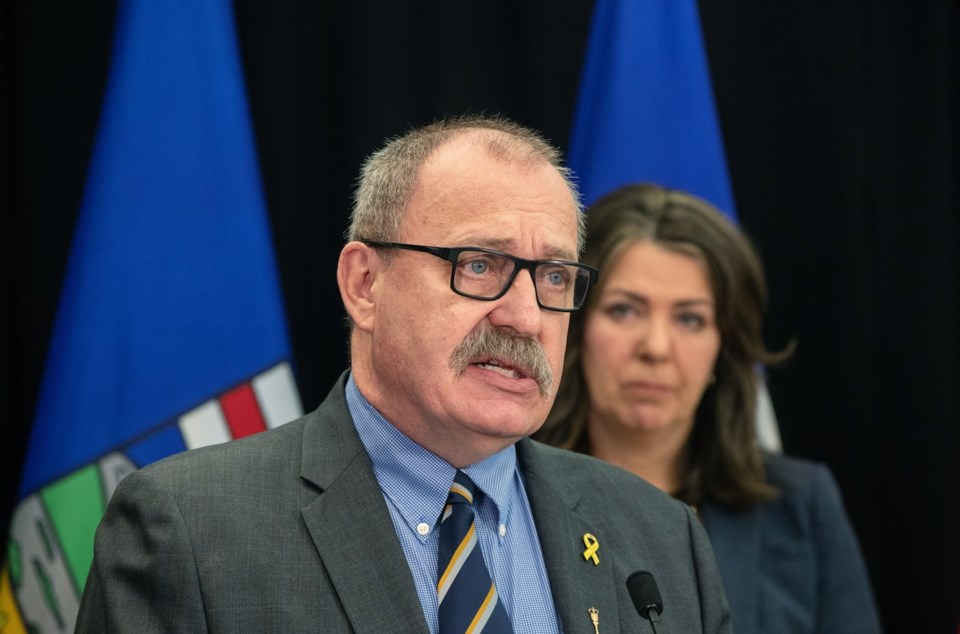Alberta's municipalities can apply for a share of a new $20-million provincial infrastructure grant, but Municipal Affairs Minister Ric McIver says more funding is needed.
McIver told reporters Tuesday the province aims to distribute $20 million in grant funding each year for the next three years, and the funding can be put toward roads, sewer systems and other critical infrastructure.
McIver said the program is meant to help mid-sized cities with populations under 200,000 address infrastructure issues caused by significant population growth, though some of the annual funding will be set aside for municipalities with fewer than 10,000 people.
"Sometimes the water treatment plant doesn't have enough capacity … sometimes there might be a road or an intersection that needs to be improved in order for a new business or a new job opportunity to happen, and this, what we're announcing today, is intended to help with that," McIver said.
"We recognize that the (program) will not be a silver bullet or a solution to all the infrastructure problems, but it is indeed, we believe, a step in the right direction."
Between July of 2023 and July of this year Alberta's population grew by about 200,000 people, or 4.4 per cent, which was the highest growth rate of any province.
Over the same period in 2022 and 2023, Alberta's population grew by 3.9 per cent.
The new grant will likely be oversubscribed, McIver said, given the limited funding pot and the widespread need for additional infrastructure funding across the province.
McIver said he himself was hoping there would be more funding available, "but sometimes when you go to (the) Treasury Board as a minister, you don't get everything you ask for."
Alberta Municipalities, the organization that represents mid-sized cities, estimates there is a $30-billion infrastructure deficit across the province.
Tyler Gandam, president of Alberta Municipalities and mayor of Wetaskiwin, Alta., agreed the new program is a step in the right direction.
Gandam said the funding pot is a "far cry away" from addressing municipal infrastructure needs, but he's hoping the government will see the impact that even $20 million can have and increase funding in future years.
"Growth doesn't pay for itself when the municipality is front-ending a bunch of money for infrastructure, especially the underground infrastructure," he said.
Gandam pointed to the city of St. Albert, Alta., northwest of Edmonton, which is currently facing a nearly $70-million bill for a major stormwater and wastewater capacity upgrade.
The city, which has seen modest population growth compared to other mid-sized cities in the province, paused approvals on most development in the expanding residential area in the northeast in 2022 because it was determined the existing sewer system's capacity reached a breaking point.
If the city wants development in the area to resume, it will need to increase the sewer system's capacity. However, the city will need to take on debt in order to fund the project, and a $70-million debenture would mean the city would have limited resources available for other critical projects, such as a new fire station and firefighters to staff it.
St. Albert Mayor Cathy Heron was unavailable for an interview.
Jeff Genung, the mayor of Cochrane, Alta., which has seen its population nearly double since 2016, told The Canadian Press he was "thrilled" with the Alberta government's new grant.
"The province is recognizing the growth pressures that mid-size cities are facing, and Cochrane falls right into the middle of that," said Genung, whose town is just northwest of Calgary. "The pace of the growth that we're experiencing is forcing us to have to deal with things faster than what we're equipped for or even have the organizational capacity to deal with."
Genung said one of the first complaints new Cochrane residents have is about traffic, which he said was a result of the town's rapid population growth leading to more cars than ever travelling on its roads.
But Genung said the town's water, wastewater and even recreational infrastructure is being overwhelmed, which he hopes this new grant will help address.
"This is a beginning, and if we work together and prove to the province through the utilization of this new grant, my thoughts and my goals and my dreams are that this grows into something bigger," he said.
Peter Brown, the mayor of Airdrie, Alta., is also supportive of the new program, which he said is coming at a time when his city north of Calgary is eyeing sewer capacity and new water lines.
"Right now, the No. 1 issue for us is a sewer pipe for sure," said Brown, adding that recreational amenities are also in desperate need.
Brown said that while additional funding for the program would be beneficial, he appreciates that the province is recognizing the issue.
"Let's be fair, the province has been calling people from all over the world to move here because, in my opinion, obviously Alberta is the place to be and a lot of people are recognizing that, but that comes with huge demands on our existing infrastructure."
This report by The Canadian Press was first published Oct. 22, 2024.
Jack Farrell, The Canadian Press



